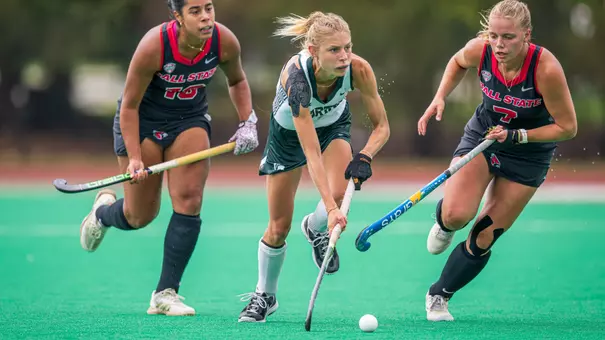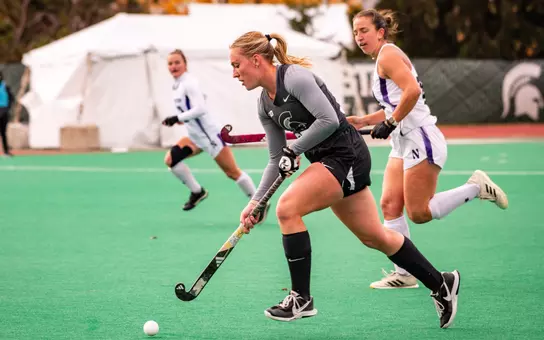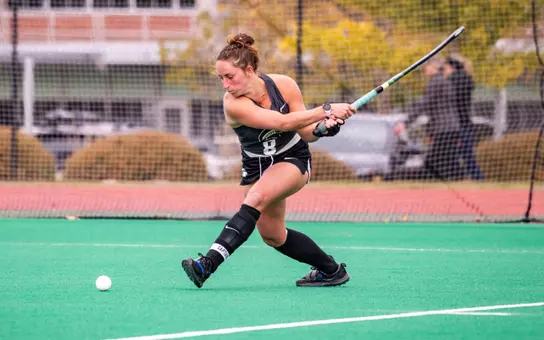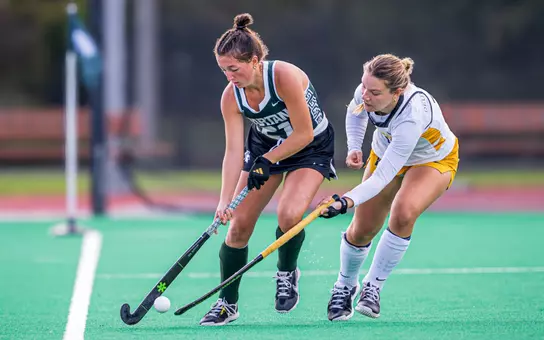
Field Hockey Feature: International Roots
10/8/2018 12:13:00 PM | Field Hockey
By Kyle Turk
MSU Athletic Communications
EAST LANSING, Mich. -- If you're within earshot of a Michigan State field hockey match, there's a strong chance you'll hear the usual words of encouragement from parents in the stands or maybe some instructions from a coach.
But if you listen closely, you might hear a sharp Scottish accent, or even some Dutch.
There are five international players on the MSU roster: freshmen forwards Aisha Osinga and Isa van der Weij and freshman defender Daphne Voorman from the Netherlands, plus freshman goalkeeper Jade Arundell from Ireland and junior midfielder Makenzie Brown from Scotland.
Arundell and Brown have a synergy of their own, being from a region with similar dialects and phrases. "I find it really easy with Mak," Arundell said. "When I say something, she understands what I'm saying. We use the same words for describing things. I'll say something and the whole team won't know, but Mak will know."
The three Dutch players have also found a way to incorporate their language into their play, even though all three of them have spoken English for years. "When I ask those two for the ball, it's in Dutch," van der Weij said. "When I give them a compliment, it's in Dutch. I don't even have to think about it."
The Netherlands has been a longtime field hockey powerhouse at the international level, so it made plenty of sense for head coach Helen Knull, a native of Scotland, to recruit three Dutch players to East Lansing. Knull moved from Scotland to play at Kent State in Ohio, and is now in her eighth year as MSU's head coach. "They start their hockey at four, five years old," Knull said about the field hockey culture in the Netherlands. "They're often technically a little bit further ahead of the domestic [players] but I think they learn a lot more about mentality and strength and conditioning initially."
Players have made the overseas trip to play collegiate field hockey for decades, but there aren't exactly entire teams made up of international players. Knull said there are a few logistics to sort through when it comes to putting the right players in yearly recruiting classes. "There are scouting services, yes, but also contacts and alums," Knull said. "There are a lot of companies that are helping kids get scholarships but you do have to vet them out to know who you're getting and what you're getting."
So why come across an entire ocean just to play field hockey? For some, the opportunity makes sense, as it allows them to combine academics and athletics.
"We can't really combine the two at home," Osinga said. "It's really tough to find a high level of school and a high level of field hockey together." Osinga plans to study economics while at MSU and Voorman is currently a business-preference major. Both cited academics as a major factor when choosing MSU.
For many college students, it's pretty simple to get their mom or dad on the phone and check in. With a five or six-hour time difference, it can sometimes be a struggle just to keep in touch for the international Spartans.
"When we're done with practice around 6 [p.m.], our whole day is done," Voorman said. "Then we finally have time to talk to people. Then it's 12 in the Netherlands and everyone is asleep."
As a junior, Brown has a unique position of being able to talk the quartet of freshmen through missing family or other difficulties that come with moving to a different continent for school. Brown came to MSU in the spring semester of her freshman year, facing the rough elements of a Michigan winter right away.
"For me, I've definitely learned that nothing comes easy," Brown said. "You have to work hard every day and make the most of your time here. It goes by so quickly."
It's a stark contrast between the international and domestic players on the MSU roster when it comes to level of experience. Almost all of the international athletes have played field hockey for a decade or more before coming to the U.S., where there are few youth organizations playing an organized form of the sport. For them, field hockey was an option for athletic participation in schools, very different from its culture in the U.S.
"Where you'd see one field here, in the Netherlands there'd be about 10 fields next to each other," Brown said. "It is just multiplied how much they play there."
The biggest difference all the international players have noticed when comparing the European style of play to the type of strategy involved in the college game involves passing. With less technical background, the American game revolves less around team play and more on one-on-one ability.
"It's a lot less dribbling [in Europe]," van der Weij said. "The pace of play can be faster here, the decision-making of the team has to be faster. It's not necessarily a bad thing, though."
While there was bound to be some initial uneasiness for the freshmen, having a little bit of extra familiarity from home has made the difference.
"At first, it's hard to express yourself," Voorman said. "I had a hard time with being myself at first but after a while, now there's no struggle."
MSU Athletic Communications
EAST LANSING, Mich. -- If you're within earshot of a Michigan State field hockey match, there's a strong chance you'll hear the usual words of encouragement from parents in the stands or maybe some instructions from a coach.
But if you listen closely, you might hear a sharp Scottish accent, or even some Dutch.
There are five international players on the MSU roster: freshmen forwards Aisha Osinga and Isa van der Weij and freshman defender Daphne Voorman from the Netherlands, plus freshman goalkeeper Jade Arundell from Ireland and junior midfielder Makenzie Brown from Scotland.
Arundell and Brown have a synergy of their own, being from a region with similar dialects and phrases. "I find it really easy with Mak," Arundell said. "When I say something, she understands what I'm saying. We use the same words for describing things. I'll say something and the whole team won't know, but Mak will know."
The three Dutch players have also found a way to incorporate their language into their play, even though all three of them have spoken English for years. "When I ask those two for the ball, it's in Dutch," van der Weij said. "When I give them a compliment, it's in Dutch. I don't even have to think about it."
The Netherlands has been a longtime field hockey powerhouse at the international level, so it made plenty of sense for head coach Helen Knull, a native of Scotland, to recruit three Dutch players to East Lansing. Knull moved from Scotland to play at Kent State in Ohio, and is now in her eighth year as MSU's head coach. "They start their hockey at four, five years old," Knull said about the field hockey culture in the Netherlands. "They're often technically a little bit further ahead of the domestic [players] but I think they learn a lot more about mentality and strength and conditioning initially."
Players have made the overseas trip to play collegiate field hockey for decades, but there aren't exactly entire teams made up of international players. Knull said there are a few logistics to sort through when it comes to putting the right players in yearly recruiting classes. "There are scouting services, yes, but also contacts and alums," Knull said. "There are a lot of companies that are helping kids get scholarships but you do have to vet them out to know who you're getting and what you're getting."
So why come across an entire ocean just to play field hockey? For some, the opportunity makes sense, as it allows them to combine academics and athletics.
"We can't really combine the two at home," Osinga said. "It's really tough to find a high level of school and a high level of field hockey together." Osinga plans to study economics while at MSU and Voorman is currently a business-preference major. Both cited academics as a major factor when choosing MSU.
For many college students, it's pretty simple to get their mom or dad on the phone and check in. With a five or six-hour time difference, it can sometimes be a struggle just to keep in touch for the international Spartans.
"When we're done with practice around 6 [p.m.], our whole day is done," Voorman said. "Then we finally have time to talk to people. Then it's 12 in the Netherlands and everyone is asleep."
As a junior, Brown has a unique position of being able to talk the quartet of freshmen through missing family or other difficulties that come with moving to a different continent for school. Brown came to MSU in the spring semester of her freshman year, facing the rough elements of a Michigan winter right away.
"For me, I've definitely learned that nothing comes easy," Brown said. "You have to work hard every day and make the most of your time here. It goes by so quickly."
It's a stark contrast between the international and domestic players on the MSU roster when it comes to level of experience. Almost all of the international athletes have played field hockey for a decade or more before coming to the U.S., where there are few youth organizations playing an organized form of the sport. For them, field hockey was an option for athletic participation in schools, very different from its culture in the U.S.
"Where you'd see one field here, in the Netherlands there'd be about 10 fields next to each other," Brown said. "It is just multiplied how much they play there."
The biggest difference all the international players have noticed when comparing the European style of play to the type of strategy involved in the college game involves passing. With less technical background, the American game revolves less around team play and more on one-on-one ability.
"It's a lot less dribbling [in Europe]," van der Weij said. "The pace of play can be faster here, the decision-making of the team has to be faster. It's not necessarily a bad thing, though."
While there was bound to be some initial uneasiness for the freshmen, having a little bit of extra familiarity from home has made the difference.
"At first, it's hard to express yourself," Voorman said. "I had a hard time with being myself at first but after a while, now there's no struggle."
Players Mentioned
Spartans All-Access | Senior Reflections
Tuesday, November 12
Inspiring The Spartans | Spartans All-Access
Wednesday, September 18
Spartans All-Access | Making Each Other Better
Wednesday, August 21
Spartans All-Access: Ashley Harlock
Thursday, November 02








